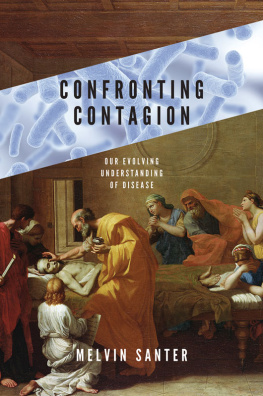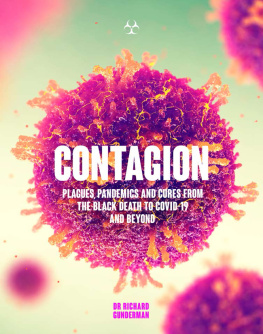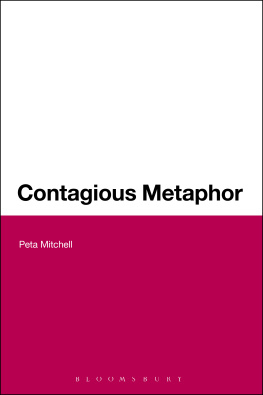Santer - Confronting contagion: our evolving understanding of disease
Here you can read online Santer - Confronting contagion: our evolving understanding of disease full text of the book (entire story) in english for free. Download pdf and epub, get meaning, cover and reviews about this ebook. year: 2014, publisher: Oxford University Press, Incorporated, genre: Science. Description of the work, (preface) as well as reviews are available. Best literature library LitArk.com created for fans of good reading and offers a wide selection of genres:
Romance novel
Science fiction
Adventure
Detective
Science
History
Home and family
Prose
Art
Politics
Computer
Non-fiction
Religion
Business
Children
Humor
Choose a favorite category and find really read worthwhile books. Enjoy immersion in the world of imagination, feel the emotions of the characters or learn something new for yourself, make an fascinating discovery.
Confronting contagion: our evolving understanding of disease: summary, description and annotation
We offer to read an annotation, description, summary or preface (depends on what the author of the book "Confronting contagion: our evolving understanding of disease" wrote himself). If you haven't found the necessary information about the book — write in the comments, we will try to find it.
Santer: author's other books
Who wrote Confronting contagion: our evolving understanding of disease? Find out the surname, the name of the author of the book and a list of all author's works by series.
Confronting contagion: our evolving understanding of disease — read online for free the complete book (whole text) full work
Below is the text of the book, divided by pages. System saving the place of the last page read, allows you to conveniently read the book "Confronting contagion: our evolving understanding of disease" online for free, without having to search again every time where you left off. Put a bookmark, and you can go to the page where you finished reading at any time.
Font size:
Interval:
Bookmark:

Confronting Contagion

Oxford University Press is a department of the University of Oxford.
It furthers the Universitys objective of excellence in research, scholarship, and education by publishing worldwide.
Oxford New York
Auckland Cape Town Dar es Salaam Hong Kong Karachi
Kuala Lumpur Madrid Melbourne Mexico City Nairobi
New Delhi Shanghai Taipei Toronto
With offices in
Argentina Austria Brazil Chile Czech Republic France Greece
Guatemala Hungary Italy Japan Poland Portugal Singapore
South Korea Switzerland Thailand Turkey Ukraine Vietnam
Oxford is a registered trade mark of Oxford University Press
in the UK and certain other countries.
Published in the United States of America by
Oxford University Press
198 Madison Avenue, New York, NY 10016
Oxford University Press 2015
All rights reserved. No part of this publication may be reproduced, stored in a retrieval system, or transmitted, in any form or by any means, without the prior permission in writing of Oxford University Press, or as expressly permitted by law, by license, or under terms agreed with the appropriate reproduction rights organization. Inquiries concerning reproduction outside the scope of the above should be sent to the Rights Department, Oxford University Press, at the address above.
You must not circulate this work in any other form
and you must impose this same condition on any acquirer.
Library of Congress Cataloging-in-Publication Data
Santer, Melvin, author.
Confronting contagion : our evolving understanding of disease / Melvin Santer.
p. cm.
Includes bibliographical references and index.
ISBN 9780199356379 (ebook)
I. Title.
[DNLM: 1. Communicable Diseaseshistory. 2. Communicable Diseasesetiology.
3. Disease Outbreakshistory. WC 11.1]
RA643
616.9dc23
2014010298
9 8 7 6 5 4 3 2 1
Printed in the United States of America on acid-free paper
This book is dedicated to Ursula Victor Santer
(19322003) and Emily Miriam Santer,
Ruth Irene Santer, and Lewis Aaron Santer.
The god Apollo,
. unleashes his arrows on animals and soldiers for nine days
black bolts of plague fly on the Argives
HOMER, The Iliad
The human body contains blood, phlegm, yellow bile and black bile. These are the things that make up its constitution and cause its pains and health.
THE HIPPOCRATIC TREATISE, The Nature of Man
Now what is the cause of plagues, and whence on a sudden the force of disease can arise and gather deadly destruction for the race of men and herds of cattle, I will unfold. First I have shown before that there are seeds (semina, atoms) of many things which are helpful to our life, and on the other hand it must needs be that many fly about which cause disease and death.
LUCRETIUS, De rerum natura
An inland lake there were very many little animalcules.
Letter from Leeuwenhoek to Henry Oldenburg, First Secretary of the Royal Society
..... for the smallest sort of animalcules, which come daily to my view, I conceive to be more than 25 times smaller than one of those blood-globules which make the blood red.
Leeuwenhoek to Oldenburg
From hence it appears that the Art of Physic (Medicine) was anciently established (1) by a faithful Collection of Facts Observed, whose Effects were (2) afterwards explained, and their Causes assigned by the Assistance of Reason; the first carries Conviction along with it, and is indisputable; nothing more certain than Demonstration from Experience, but the latter is more dubious and uncertain; since every Sect May explain the Causes of particular Effects upon different Hypotheses.
HERMAN BOERHAAVE, Academical Lectures on the Theory of Physics, 1751, 2nd edn, vol. 1; Eighteenth Century Collections Online, http://galenet.galegroup.com/servlet/ECCO
That man has long and persistently been concerned to achieve some understanding of the enormously diverse, often perplexing, and sometimes threatening occurrences in the world around him is shown by the manifold myths and metaphors he has devised in an effort to account for the very existence of the world and of himself, for life and death, for the motion of the heavenly bodies, for the regular sequence of day and night, for the changing seasons, for thunder and lightning, sunshine and rain. Some of these explanatory ideas are based on anthropomorphic conceptions of the forces of nature, others invoke hidden powers or agents, still others refer to Gods inscrutable plans or to fate
CARL HEMPEL, Philosophy of Natural Science, 1966, Prentice-Hall
This book had its beginnings when my wife, Ursula Victor Santer, and I taught a course for non-scientists at Haverford College designated History of Microbiology. Such Histories generally concentrated on the role of microorganisms in disease, and therefore their narratives began in the nineteenth century. Disease theory, however, begins millennia before the nineteenth century; the written materials provide a rich source of speculation about the cause of infectious/contagious diseases. That theorizing is an integral part of the speculations about the content and operation of the physical and biological world. I encourage the reader to read Notes to the Reader and the prologue to gain an introduction to the form and content of the book.
I want to thank a number of people who read portions of the book and encouraged me to continue. They are Jim Joyce, Sidney Axinn, Ruth Rothman, Lewis Santer, Karl Johnson, Madelyn Gutwirth, Marcel Gutwirth, Jim Dahlberg, and Tracy Kosman. I want to thank Lewis Santer, who has contributed to the book during the final stages of its preparation. I love you.
My thanks go to Dora Wong, science librarian at Haverford College. I am indebted to Sasha Santer Hill for work on Permissions to quote copyrighted material. I want to thank Professor K. Codell Carter for providing me with the original J. Henle reference used in .
Walter Pagel opens his book on Paracelsus, An Introduction to Philosophical Medicine in the Era of the Renaissance, with the following paragraph:
Much of modern medicine developed in the xvith and xviith centuries against a background of trends of thought that were not purely or mainly scientific. The main purpose of the present writers historical enquiries since 1926 has been to place scientific and medical discoveries in the to us less comprehensible philosophical and religious setting in which they first appeared
PAGEL, p. 1, 1958, Karger
Pagel is stating the essential fact that to understand the origins of disease theories during any historical period, one must understand the contemporary philosophical and religious ideas about the composition and the operation of the world. It is my intention to adopt and extend this approach to understand the cause of infectious/contagious disease starting in antiquity and going forward to the twentieth century.
I want to request of you, dear reader, to temporarily suspend judgment about the causes of contagious disease that you know to be the initiated by the invasion of a host by various microscopic agents. I request the suspension of this knowledge so that you can place yourself in the particular period, prior to the last quarter of the nineteenth century, that will be described and can find yourself, like the writers of the time, struggling to understand a phenomenon that is visible but incomprehensible because its underlying causes are invisible and impossible to know. Despite this difficulty, it was essential for humans to try to explain the causes of these diseases in order to treat them. This crucial philosophical assumption is in the Hippocratic treatise
Next pageFont size:
Interval:
Bookmark:
Similar books «Confronting contagion: our evolving understanding of disease»
Look at similar books to Confronting contagion: our evolving understanding of disease. We have selected literature similar in name and meaning in the hope of providing readers with more options to find new, interesting, not yet read works.
Discussion, reviews of the book Confronting contagion: our evolving understanding of disease and just readers' own opinions. Leave your comments, write what you think about the work, its meaning or the main characters. Specify what exactly you liked and what you didn't like, and why you think so.











